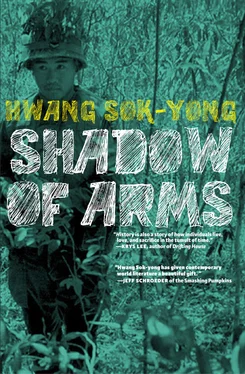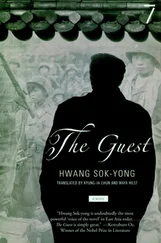Nguyen Thach was going over the modus operandi he intended to carry out with Minh’s help. He continued: “And the next thing is the food and medicine. Those are items we must come up with through our own resourcefulness in trading.”
“Will it be rice, sir?”
“Rice is traded openly; it’s a basic commodity in the market. We can transplant rice twice a year, and even under the French our country was famous for exports of Annam rice, but over 40 percent of our paddies in central Vietnam, not to mention the Mekong Delta, have been turned into battlefields. So the main rice trading these days is concerned with relief grain from California. Just like with cement and fertilizer, it’s easy work. It’s plentiful all over the market. The more important thing is the combat rations — we can’t afford expensive food for guerillas in the jungle. Nothing is more convenient than C-rations for operations requiring blackouts or secret mobilizations, like night reconnaissance, infiltration, and ambushes. We also need C-rations to feed the wounded in the swamps.
“Along with guns, the trade in C-rations is one of the most sensitive for the American intelligence investigators. So we have to make small purchases and gradually accumulate stockpiles. As for medicines, in this tropical climate the items most in demand are antibiotics, antiparasitics, and painkillers. Terramycin, streptomycin, quinine and, most of all, anesthetics and morphine are hard to come by in the jungle. We use refined heroin as a painkiller sometimes, but it’s risky. If we carry out this task, the duty of linking up with the various cells will be transferred to another section.”
“Are we the only ones doing such work in Da Nang’s Third Special District, sir?”
“Ah, naturally there’s a transportation team that connects the city with the countryside and another team working across from the smokestack. And we have administrative agents in the market collecting taxes, of course. After being reinforced the total strength of the 434th Special Action Unit is now sixty fighters, divided into four companies. You’ll learn the details after you become a regular agent. By the way, your status is secure now?”
Minh took his dog tags out from beneath his shirt and showed them to Thach.
“I’m a sergeant in the air force, sir. I belong to the maintenance detachment at the air base.”
“Well done. That’ll be very useful later.”
Nguyen Thach walked toward the warehouse door. “I’ll be dropping in every day around this time or before you’re finished for the day,” he added.
Once he was gone, Minh went over their discussion and rearranged the information in his head, carefully organizing everything lest he forget. He heard a truck pulling up outside, and after it stopped the foreman came in with three men. The foreman greeted Pham Minh with a nod and a merchant from the country extended his hand. He said he had come from Hoi An.
“The payment has been made.”
Looking at Minh’s delivery order, the foreman pointed to the kind and quantity of merchandise that had been circled in red ink.
“Here it is. Hoi An.”
Pham Minh released the cement and fertilizer and got a receipt for the delivery. Nguyen Cuong, who had just walked in, nodded.
“I knew you’d do fine. Save those documents and give them to the major. I’ll give you the final approval.”
The little notebook belonging to the head of the Hong Kong Group had disclosed three of their lines of business and led to one very important discovery. Chairman Pak had written down the names of the clubs and bars he had been supplying with beer and cigarettes, including the Bamboo Sports Club as well as minor inns. Even a few brothels were identified. Colonel Cao and Major Krapensky must have been very unhappy.
The cigarettes had been coming mainly from the air force PX and electric appliances from the marine PX. The beer supplies had only recently been switching over from Hamm’s to Korean beer. Lately the supply of Korean beer had grown and the price was down in the market, no doubt about that. The captain and Yong Kyu already knew very well that the Hong Kong Group had been working together with the chief sergeant from the investigation team, the staff sergeant from the supply corps detachment, and the master sergeant in charge of the canteen at brigade. Under the acronym MAC, a list of names was written down in alphabetical order, and there was also an entry for Puohung Company in Le Loi market.
Yong Kyu thought Puohung might well be a channel through which A-rations were flowing out. Fresh A-rations, as everybody knew, were unloaded at Bai Bang Harbor, from where the heaps of produce were sent to the refrigerated navy warehouse across from the smokestack. The good thing about A-rations was that they were perishable and so could not be stored very long. Further, marketing food was always easy. It was widely known that the US economic team had been controlling the prices by regulating supplies.
It seemed that Pak had, without access to the inside mechanics, succeeded in tapping into a supply channel for these profitable items. He even had a Vietnamese merchant lined up to take A-rations off his hands. With the Puohung Company nearby in Le Loi market, the investigation would be easy, and the owner might turn out to be dealing in luxury items as well as A-rations. Pak’s list also included some Vietnamese traders who could be dealing in weapons.
The whole Hong Kong Group, including Lieutenant Colonel Pak, Pig, Pak’s brother-in-law, and the crew cut, had been taken to the police station. They were interrogated only about the Salem cigarettes from the air force PX and the four pallets of beer stored at the pier. All of them were so discouraged that they answered the questions meekly. The captain told Pak to keep his hands off the beer, but was less adamant about the cigarettes. He alluded to the fact that the flow of beer, especially Korean beer, into the market had been irritating the Americans and that, unless stopped, it would enrage Colonel Cao, the police superintendent, who liked to keep his hand on the beer tap in Da Nang. Pak was told that he would be allowed to deal only in luxury items and appliances from the PX. Pak didn’t respond to that. As soon as the prisoners were released, the captain went to the Dragon Palace with Yong Kyu and the chief sergeant to have lunch.
“What next?” Yong Kyu said, and went on in a joking tone. “Shall I bring in the staff sergeant from the supply corps and the master sergeant from the brigade canteen and punch them in the nose?”
“Hey,” the chief sergeant said, “they’ve only been dealing in order to put a little cash away for when they take off their uniforms. They haven’t committed any serious crimes, have they? Fight when you have to fight, and make money while you can, that’s what I say. We came here to make some stinking money, and nobody stole anything, we just did a little business, that’s all.”
“Listen, you: you’ve got to figure out your right foot from your left. Blue Jacket Ahn is trying to cover for you. He’s got the detachment by the throat, isn’t that right?
“When the pictures are developed, it’ll be more than enough,” Yong Kyu said.
“From now on all the Korean beer is yours,” the captain said to the chief sergeant. The latter started to sulk.
“What do you expect me to do, go out and sell it myself door to door? I don’t speak the language and I don’t know any Vietnamese merchants.”
“Don’t worry about it. I wrote down all the dealers that Lieutenant Colonel Pak was using.”
Yong Kyu took out his notebook and showed it to them.
“What do you know, that slimy woman who owns this place, that raccoon, she’s one of Pak’s customers, too,” the captain said in a low voice.
Читать дальше












